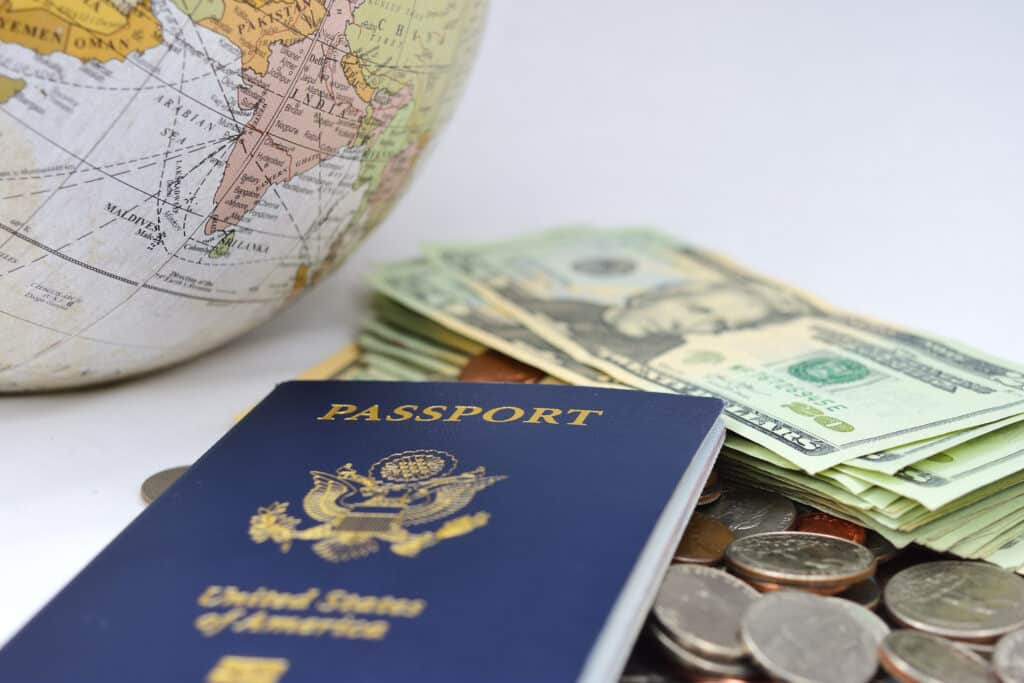FEIE Form 2555 Benefit – A Guide for Expats

What is IRS Form 2555?
Form 2555 is a document for expats who want to or are eligible to exclude their foreign-earned income from taxes. As you fill out the form, you declare your different sources and types of income. Then, you attach it to your U.S. tax return.
However, not all types of income are eligible for the Foreign Earned Income Exclusion (FEIE). You can only include earned income or income from work or services “physically” performed in a foreign country.
Generally, the location where you received the payment doesn’t matter. As long as you can prove that you earned this income while living abroad, the Internal Revenue Service (IRS) can consider it part of the Foreign Earned Income Exclusion (FEIE). To qualify for exclusion, you must not have an abode in the U.S., meet the tax home test, and pass either the Physical Presence Test or the Bona Fide Residence Test.
Before going through these tests, you should know the foreign income types you can and cannot claim on your Form 2555.
If you qualify, you can use Form 2555 to determine your foreign-earned income exclusion and your housing exclusion or deduction. You cannot exclude or deduct more than your foreign earned income for the year.
What is earned Income?

As the label suggests, this is the type of foreign income you earned for a service you have physically performed in another country.
1. Salary
If your salary, wage, or tip came from work physically performed outside of the U.S., it counts as foreign income. Even as an expat, the IRS considers it foreign income if a U.S. company pays you. If you received payment for personal services performed on foreign soil, you could include it on your FEIE.
However, the IRS notes that you can’t include “amounts received for personal services provided to a corporation that represent a distribution of earnings and profits rather than reasonable compensation.”
2. Commissions
Employers sometimes use sales commissions as incentives to sell certain services or goods. They pay you based on performance, either on top of your salary or instead of on a paycheck. Nevertheless, you can include this in your FEIE. Ensure you coordinate with your employer about your taxes to avoid double taxation.
3. Bonuses
Employers give bonuses to employees who do exceptional work as another workplace incentive. Examples include retention, signing, and referral bonuses. If you received any of these rewards for the tax year, you could include them in your FEIE. Other than cash, some companies provide stock or stock options as rewards, which count as earned income.
Unearned or Passive Income
On the other hand, there are foreign income types that depend heavily on certain factors before you can regard them as earned or unearned income, and they fall under variable income.
4. Rents from foreign real estate
Rent is considered passive or unearned income because you aren’t working to receive this income. The same applies to investment income, such as interest and capital gains. Passive income isn’t eligible for the FEIE.
5. Royalties
Royalties are considered passive and not earned for foreign-earned income exclusion purposes.
Pro Tip: You can still qualify for the Foreign Earned Income Exclusion even if you work in a country that doesn’t impose income tax on your earnings, such as the UAE. This allows you to exclude your foreign-earned income from U.S. taxes regardless of the local tax situation.
What is the Tax Home Test?

To meet this test, your tax home must be in a foreign country or country throughout your period of bona fide residence or physical presence, whichever applies. For this purpose, your period of physical presence is the 330 full days you were present in a foreign country, not the 12 consecutive months during which those days occurred.
Your tax home is your regular or principal place of business, employment, or post of duty, regardless of where you maintain your family residence. If you do not have a regular or principal place of business because of the nature of your trade or business, your tax home is your regular place of abode (where you regularly live).
You are not considered to have a tax home in a foreign country for any time your abode is in the United States. However, if you are temporarily present in the United States or maintain a dwelling in the United States (whether or not that dwelling is used by your spouse and dependents), it does not necessarily mean that your abode is in the United States during that time.
The idea behind the tax home test is that the exclusion isn’t intended to help short-term temporary workers but rather those who permanently relocate overseas.
Bona Fide Residence Test
To meet this test, you must be one of the following:
- A U.S. citizen who is a bona fide resident of a foreign country, or countries, for an uninterrupted period that includes an entire tax year (January 1–December 31, if you file a calendar year return) or
- A U.S. resident alien who is a citizen or national of a country with which the United States has an income tax treaty in effect and who is a bona fide resident of a foreign country or countries, for an uninterrupted period that includes an entire tax year (January 1–December 31, if you file a calendar year return). See IRS Publication 901, U.S. Tax Treaties, for a list of countries with which the United States has an income tax treaty in effect.
Whether you are a bona fide resident of a foreign country depends on your intention about the length and nature of your stay. Evidence of your intention may be your words and acts. If these conflict, your acts carry more weight than your words. Generally, if you go to a foreign country for a definite, temporary purpose and return to the United States after you accomplish it, you are not a bona fide resident of the foreign country. If completing the purpose requires an extended, indefinite stay, and you make your home in a foreign country, you may be a bona fide resident.
Pro Tip: You can qualify as a Bona Fide Resident for part of the year if you spent at least a full tax year outside the U.S. in a previous year. This allows you to file Form 2555 and claim the exclusion for that part-year period.
Physical Presence Test
To meet this test, you must be a U.S. citizen or resident alien physically present in a foreign country or countries, for at least 330 full days during any period of 12 months in a row. A full day means a 24-hour period that starts at midnight.
The 12-month period on which the physical presence test is based must include 365 days, part of which must be in the tax year being reported. The dates may begin or end in a calendar year other than the tax year being reported as long as part of the 12 months includes a portion of the tax year being reported.
Need US expat tax advice? Book a consultation now!
Claiming the Foreign Housing Exclusion or Deduction

In addition to the Foreign Earned Income Exclusion (FEIE), U.S. expats can claim Foreign Housing Exclusion or Deduction on Form 2555, which helps reduce taxable income by accounting for housing expenses incurred while living abroad.
Foreign Housing Exclusion vs. Deduction
- Foreign Housing Exclusion: This applies to employees. It allows you to exclude qualified housing expenses from your gross income, thereby reducing the income subject to U.S. taxes. This exclusion is taken before computing the foreign-earned income exclusion.
- Foreign Housing Deduction: This applies to self-employed individuals. It allows you to deduct qualified housing expenses from your gross income. Unlike the exclusion, the deduction is claimed after computing the foreign-earned income exclusion.
Both the exclusion and deduction aim to offset the costs of maintaining a household abroad, including rent, utilities, and other necessary expenses.
Qualified Housing Expenses
These expenses generally include:
- Rent
- Utilities (excluding telephone)
- Real and personal property insurance
- Repairs and maintenance
- Furniture rental
- Residential parking
However, expenses for lavish housing accommodations, household help, and similar costs are not considered qualified.
Limitations and Calculations
The amount you can exclude or deduct is limited. For 2024, the base housing amount is 16% of the annual FEIE limit ($126,500), which equals $20,240. The maximum housing expense that you can exclude is generally 30% of the FEIE limit, which for 2024 is $37,950. The exact amount can vary based on your location and actual expenses incurred.
Foreign Earned Income Exclusion vs Foreign Tax Credit

U.S. taxpayers abroad have two primary tools to avoid double taxation on foreign income: the Foreign Earned Income Exclusion (FEIE) and the Foreign Tax Credit (FTC).
So, what’s the difference between the two?
The Foreign Earned Income Exclusion allows you to exclude a certain amount of your foreign-earned income from U.S. taxation. On the other hand, the Foreign Tax Credit (Form 1116) provides a dollar-for-dollar reduction of your U.S. tax liability for foreign income taxes paid. Unlike the FEIE, you can claim the FTC for taxes paid on earned and passive foreign income. There is no limit to the amount of foreign tax credits you can claim. However, they must not exceed your U.S. tax liability.
Pro Tip: If you pay foreign taxes on passive income, like capital gains, you can utilize the Foreign Tax Credit to reduce or even eliminate your U.S. tax liability.
Choosing Between FEIE and FTC
Whether to use the FEIE or the FTC depends on your circumstances. Some taxpayers may benefit from using a combination of both. For instance, you might exclude part of your income using the FEIE and claim the FTC on the remaining taxable income.
Factors to Consider:
- Total Foreign-Earned Income: The income exclusion is particularly advantageous for individuals with lower foreign-earned incomes. If their earnings fall below the exclusion threshold, the FEIE could reduce their tax liability to zero.
- Tax Rate Comparison: If you reside in a country with lower tax rates than the U.S. or pay no income tax, the FEIE can be more beneficial. However, the foreign tax credit might offer greater relief if you pay substantial foreign taxes.
- Employment Type: The Foreign Earned Income Exclusion can be ideal for independent contractors or freelancers who can structure their work to meet the exclusion requirements. These workers often have more flexibility in managing their income and residency tests.
- Dependent Credits: If you have qualifying children, you can’t claim the refundable additional child tax credit if you claim the foreign earned income exclusion. In such cases, opting for the foreign tax credit over the income exclusion may be more advantageous.
- IRA Deduction: To claim an IRA deduction, you need earned income. Since the FEIE excludes earned income, using the FTC might be more suitable if you wish to contribute to an IRA.
When To File Form 2555

You should file the form for the first year you plan to take the foreign earned income exclusion and/or the housing exclusion or deduction, even though you may not yet have met either the physical presence test or the bona fide residence test by the due date of your return (including the automatic 2-month extension). If this occurs, you can either:
- Apply for a particular extension to a date after you expect to qualify on Form 2350, or
- File your return timely without claiming the exclusion and then file an amended return after you qualify.
When filing, you must attach Form 2555 to your tax return to claim the exclusion and provide the necessary details about your foreign-earned income and residency status.
How to Complete Form 2555
Filling out Form 2555 is crucial for U.S. expats who want to claim the Foreign Earned Income Exclusion (FEIE) and the Foreign Housing Exclusion or Deduction. Here’s a breakdown of each part:
Part I – General Information
Enter your personal details, including your address, occupation, and employer information. This section establishes the basic information the IRS needs to process your claim.
Part II – Bona Fide Residence Test
This section is for those qualifying under the Bona Fide Residence Test. Provide details about your stay abroad, such as the type of home you live in and your visa type. Include the dates you entered and exited the U.S. during the tax year.
Part III – Physical Presence Test
This is for those qualifying under the Physical Presence Test. You need to list the countries you lived in and the specific dates you were in and out of the U.S. during the 12 months used to qualify.
Part IV – Foreign Earned Income
You report details about your foreign-earned income here. This includes your total earnings and any business expenses incurred. Accurate reporting in this section is crucial for calculating your exclusion.
Part V – Housing Exclusion or Deduction
Indicate whether you also claim the Foreign Housing Exclusion (FHE) or Deduction. This section sets the stage for the calculations in the following parts.
Part VI: Housing Exclusion Calculation
For those claiming the foreign housing exclusion, this section involves calculating your housing exclusion allowance. Detail your housing costs, such as rent, utilities, and other qualified expenses.
Part VII – Foreign Earned Income Exclusion (FEIE)
Calculate the foreign-earned income you can exclude from your taxable income. This section ensures you correctly apply the FEIE limits.
Part VIII – Combined Exclusions
Calculate your combined FEIE and FHE allowances. It helps you determine the total amount you can exclude from your gross income for the tax year.
Part IX – Housing Deduction Calculation
This section is for those claiming the Foreign Housing Deduction (FHD) and involves calculating your FHD allowance. Complete this part only if you meet certain conditions, such as your housing expenses exceed a specified threshold.
Pro Tip: If you and your spouse both work overseas and each meets either the Bona Fide Residence Test or the Physical Presence Test, you can both claim the Foreign Earned Income Exclusion separately. This means you can collectively exclude up to twice the exclusion limit, significantly lowering your taxable income.
Include Form 2555 With Your Return
U.S. expats face a number of unique challenges that most U.S. workers and taxpayers in the U.S. never have to address. The Foreign Earned Income Exclusion offers a valuable tax break for U.S. citizens living abroad but can add complexity to your tax return. Despite this, the exclusion is well worth the effort as it prevents double taxation on the same income, leading to significant savings.
If you need help identifying if a particular type of income is foreign-earned or not, don’t hesitate to reach out to Tax Samaritan, a tax resolution partner that offers best-in-class service.
Tax Samaritan aims to provide our clients with the best counsel, advocacy, and personal service. We are not only expat tax preparation and representation experts but strive to become valued business partners. Tax Samaritan is committed to understanding our client’s unique needs; every tax situation requires a personal approach to providing realistic and practical solutions.
Do you need help filing your US expat taxes? Schedule a call using the button below.


